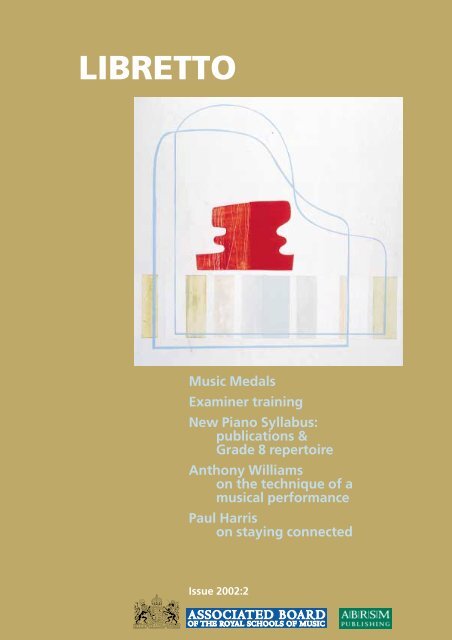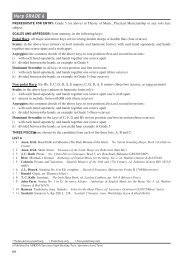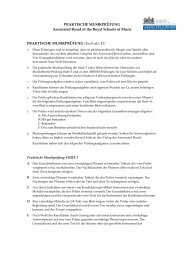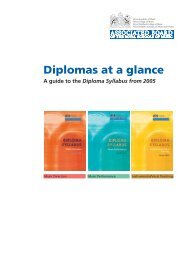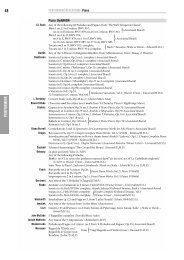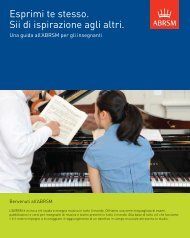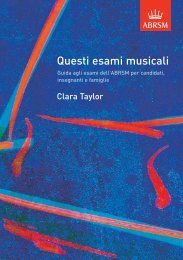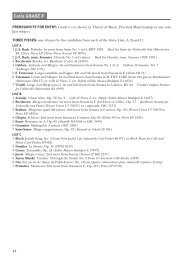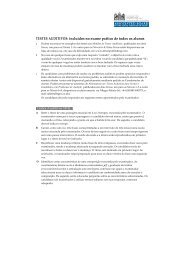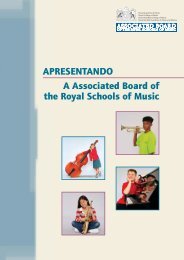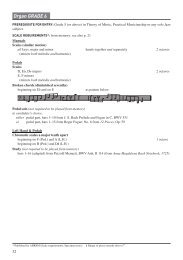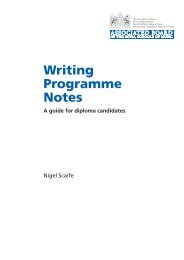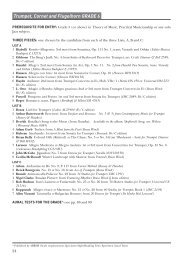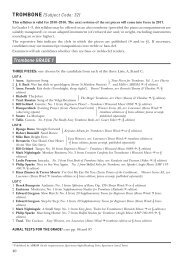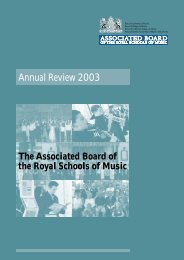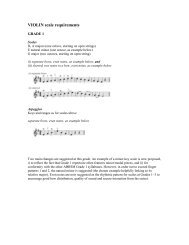LIBRETTO - ABRSM
LIBRETTO - ABRSM
LIBRETTO - ABRSM
Create successful ePaper yourself
Turn your PDF publications into a flip-book with our unique Google optimized e-Paper software.
<strong>LIBRETTO</strong><br />
Music Medals<br />
Examiner training<br />
New Piano Syllabus:<br />
publications &<br />
Grade 8 repertoire<br />
Anthony Williams<br />
on the technique of a<br />
musical performance<br />
Paul Harris<br />
on staying connected<br />
Issue 2002:2
Setting the Standards<br />
Outlook<br />
The Associated Board has strongly applauded the<br />
commitment given by the UK Government that over time<br />
every child should have the opportunity to learn to play a<br />
musical instrument. Work is now underway in earnest to<br />
give effect to this ‘music entitlement’.<br />
There are, however, many questions to be answered<br />
before the commitment can become a reality. Here are<br />
some: Who is entitled? Is it to be every child in primary<br />
education? What is the entitlement? Will it be for a<br />
certain period of instrumental tuition, free of charge, and<br />
will this provide a real opportunity for sustained learning?<br />
What genres of music are eligible? Who will teach? Will<br />
music services be able to cope with such a large influx of<br />
additional pupils? What quality assurance mechanisms will<br />
be put in place? How will sufficient instruments be made<br />
available? How will the teaching be organised and how<br />
will it relate to the National Curriculum? To what extent<br />
will tuition be carried out in schools within or outside<br />
normal school hours? How will it be funded?<br />
Various music education groups are already well<br />
advanced in thinking around matters of this sort. For<br />
example, in this issue we report the outcomes of vital<br />
research by Keele University into the factors which make<br />
young people engage or disengage with music-making; and<br />
the Federation of Music Services is poised to publish<br />
detailed proposals for their instrumental curriculum,<br />
A Common Approach.<br />
Similarly, the Associated Board has for the last three<br />
years been researching the assessment needs of young<br />
musicians who are being, and increasing numbers will be,<br />
taught in groups. On the facing page you will see an<br />
announcement of the resultant Music Medals exams,<br />
tailor-made for these students. As the Keele research<br />
concludes, it is of the utmost importance for young<br />
people to be provided with structured goals appropriate<br />
to their learning. We are confident that for children<br />
taught in groups Music Medals will do just that.<br />
Richard Morris<br />
Chief Executive<br />
Associated Board of the Royal Schools of Music<br />
24 Portland Place, London W1B 1LU, United Kingdom<br />
t +44 (0)20 7636 5400<br />
f +44 (0)20 7637 0234<br />
e abrsm@abrsm.ac.uk<br />
publishing@abrsm.ac.uk<br />
www.abrsm.ac.uk<br />
www.abrsmpublishing.co.uk<br />
Registered Charity No. 292182<br />
© 2002 by the Associated Board of the Royal Schools of Music<br />
All rights reserved. Unauthorised reproduction in whole or in part<br />
is prohibited without permission.<br />
Contents<br />
Libretto 2002:2<br />
1/3 Exams<br />
Music Medals<br />
Examiner training<br />
All about funding<br />
Grade 8 piano preview<br />
4 Professional development news<br />
Effective teaching<br />
CT <strong>ABRSM</strong> 2002-2003<br />
Travel Grant news<br />
5 Publishing news<br />
New piano exam music<br />
Competition<br />
10/11 Feature<br />
The technique of a musical performance<br />
Anthony Williams<br />
12/13 Point of view<br />
Staying connected<br />
Paul Harris<br />
14/15 News<br />
Music exams keep children playing<br />
Cool Keys<br />
Christmas competition<br />
Magnificent Music for Youth<br />
World travels<br />
From South East Asia<br />
Listen and learn<br />
A first for China<br />
Indonesia jubilee<br />
Malaysia entries<br />
16 Forum<br />
Timing<br />
Libretto is published three times a year<br />
by the Marketing Department.<br />
Editor Michelle James<br />
Assistant Editor Lucy North<br />
Insert & advertising sales Dominic Sewell<br />
t 020 8861 0848<br />
Design Tamasin Cole<br />
Cover illustration Sarah Ball<br />
Print FS Moore Ltd, London<br />
The views expressed in Libretto are not necessarily those of<br />
the Associated Board neither are the products or services appearing<br />
in advertisements and inserts endorsed by the Associated Board.
Music Medals<br />
Nigel Scaife,<br />
Syllabus Development<br />
Manager, introduces<br />
a major new syllabus<br />
being piloted in the UK<br />
from September.<br />
Group teaching in the UK<br />
Much has changed in the world of instrumental<br />
teaching and learning since the introduction of<br />
graded music exams in the late nineteenth century.<br />
One of the most significant changes in recent times<br />
has been the widespread adoption of group<br />
teaching, particularly within UK music services.<br />
While the move towards more group teaching may<br />
have been driven initially by financial imperatives as<br />
much as educational ones – more children needing<br />
to be taught by fewer teachers in less time – it has<br />
long been clear that learning an instrument in a<br />
group does have much to offer. For example, the<br />
motivation of children who enjoy making music with<br />
their friends and learning from each other, the early<br />
development of ensemble and associated listening<br />
skills, and the opportunities for creative work linked<br />
with classroom music activities. Clearly these have a<br />
place alongside the long-established and<br />
acknowledged benefits of one-to-one tuition.<br />
Teachers of some instruments have had guru<br />
figures to show the way forward: Paul Rolland and<br />
Sheila Nelson spring to mind for the violinists,<br />
although of course there are many others. For those<br />
without such figures and with fewer resources to<br />
draw on, it has been harder to develop good<br />
practice, particularly as so many instrumental<br />
teachers have not experienced group teaching as<br />
students themselves.<br />
In 1998 the Federation of Music Services and the<br />
National Association of Music Educators teamed up<br />
to produce a forward thinking ‘framework for an<br />
instrumental/vocal curriculum’, called A Common<br />
Approach, which supported an holistic approach to<br />
group teaching, learning and assessment. Their work<br />
is now being extended to include Programmes<br />
of Study that promise to be equally influential<br />
in this area.<br />
Group teaching demands different activities and<br />
strategies from the one-to-one model, as well as<br />
different kinds of assessment. This is why the<br />
Associated Board is developing an alternative<br />
pathway to sit alongside graded exams, but reflecting<br />
the activities of the group lesson – Music Medals.<br />
Breaking the mould<br />
Music Medals are exciting new assessments for<br />
group-taught students at the earliest stages of<br />
learning, with two Medals before the Grade 1 level –<br />
Copper and Bronze – followed by Silver and Gold,<br />
before moving beyond Grade 3 to the highest<br />
Platinum level. Over the last three years we have<br />
been working with experienced group teachers,<br />
music educators and composers to develop this<br />
ground-breaking syllabus and create supporting<br />
materials of the highest quality that will<br />
complement existing resources.<br />
We are piloting the syllabuses for flute, trumpet<br />
and violin from September 2002 with a view to<br />
publishing the complete syllabus and initial support<br />
materials in 2003 and launching the assessments<br />
themselves the following year.<br />
Music Medals have been designed to fit with the<br />
broad range of teaching approaches found in group<br />
lessons. Whichever tutor books or methods a teacher<br />
uses, they will find that Music Medals work with<br />
them in helping their students to achieve their best<br />
results. Music Medals will be available for most<br />
instruments commonly taught in groups. The<br />
accompanying publications will initially cover the<br />
most popular of those instruments with others<br />
included through the use of repertoire from<br />
existing publications.<br />
What does the assessment consist of?<br />
There are three sections to the assessment,<br />
Ensemble, Solo and Musicianship. Although the<br />
assessments take place in a group context,<br />
performers are marked individually. So in the<br />
Ensemble section, the examiner will assess only the<br />
single examined part, ensuring that full attention is<br />
given to the individual candidate’s contribution.<br />
Each element of the Music Medals process is<br />
transparent, with clear assessment criteria given<br />
alongside a range of exemplar materials for<br />
teachers.<br />
How will Music Medals be delivered?<br />
In piloting the syllabus with music services, we are<br />
exploring different delivery options in order to<br />
provide the highest quality service, bearing in mind<br />
the resource and cost implications of different<br />
approaches. So, watch this space! Whichever way<br />
the assessment is delivered, the teacher can be<br />
present throughout and contribute to ensemble<br />
performances when appropriate, as well as<br />
accompany solo pieces if necessary.<br />
Motivation and celebration<br />
Music Medals will form the most carefully devised<br />
suite of assessments for group-taught students in<br />
the UK. They will be both clear and easy to use. We<br />
are bringing our commitment to educational<br />
excellence, high quality publications and attention<br />
to detail to this innovative project, which will be of<br />
significant value to music education nationally.<br />
Entering students for Music Medals will provide a<br />
great way to motivate them and to recognise and<br />
celebrate their achievements – continuing in the<br />
best tradition of the Associated Board.<br />
EXAMS<br />
1
2<br />
Are you<br />
examiner<br />
material?<br />
EXAMS Examiner training<br />
We welcome applications<br />
from musicians who<br />
would like to join the<br />
panel of examiners.<br />
If you are based in the<br />
UK and would like to be<br />
considered as a potential<br />
member of this very<br />
special group of<br />
musicians, please<br />
request an application<br />
form from Philip<br />
Mundey, Director of<br />
Examinations, at our<br />
Portland Place address.<br />
Correction<br />
The simplified rubric<br />
now in use for the Aural<br />
Tests at Grades 1 to 3<br />
was unfortunately<br />
misquoted in the last<br />
edition of Libretto. It<br />
should have read:<br />
You may find it<br />
helpful to know, when<br />
preparing your pupils<br />
for the Aural Tests at<br />
Grades 1 to 3, that when<br />
examiners announce the<br />
D Test elements they<br />
simply refer to ‘smooth<br />
or detached notes’ and<br />
‘loud and quiet playing’<br />
rather than to<br />
articulation, contrasted<br />
dynamics and gradation<br />
of tone.<br />
Philip Mundey provides another<br />
glimpse into the world of the<br />
Associated Board examiner,<br />
looking this time, with<br />
Clara Taylor, at training and<br />
moderating.<br />
In the last issue I wrote about<br />
the Associated Board’s<br />
philosophy of generalist<br />
examining. The article provoked<br />
an unusually large postbag,<br />
with all but one letter<br />
expressing support for the<br />
principles which underlie our<br />
music exams. Here the focus<br />
shifts to the initial examiner<br />
training and to the monitoring<br />
which then follows, year in and<br />
year out. Clara Taylor, our Chief<br />
Examiner, leads the process:<br />
‘We provide rigorous<br />
training for potential examiners<br />
and once accepted on to the<br />
panel, they undergo regular<br />
moderations, seminars and<br />
marking exercises. Training<br />
takes place over two-and-a-half<br />
days at Portland Place, followed<br />
by four days ‘on the road’ with<br />
individual trainers. During the<br />
initial days trainees are<br />
introduced to the philosophy of<br />
examining, the importance of<br />
putting candidates at ease, the<br />
All about funding<br />
David Hoult, Principal of Leeds College<br />
of Music, shares his knowledge and<br />
experience of current funding issues.<br />
Readers of Libretto will recall that<br />
Associated Board exams were<br />
recently accredited by the<br />
government’s Qualifications and<br />
Curriculum Authority (QCA), as<br />
part of the National Qualifications<br />
Framework (NQF). This inclusion<br />
of Associated Board exams in the<br />
NQF is well known, but there<br />
seems to be less awareness of its<br />
implications for funding. In<br />
England this is the responsibility<br />
of the new Learning and Skills<br />
Council (LSC). There are similar<br />
arrangements through separate<br />
bodies in Wales and Northern<br />
Ireland, with different<br />
arrangements in Scotland. The<br />
LSC was established last year as<br />
the successor to the Further<br />
Education Funding Council and<br />
the Training and Enterprise<br />
Councils. It funds all education<br />
and training for young people<br />
aged 16 and over, and also for<br />
adults - everything except Higher<br />
assessment criteria and the<br />
administration of aural tests;<br />
they experience the procedures<br />
involved in every aspect of the<br />
exam. It can be a steep learning<br />
curve but gives a secure<br />
foundation on which to build<br />
future skills.<br />
‘Once out examining with<br />
individual trainers, the trainees<br />
observe and administer exams,<br />
the latter in increasing amounts<br />
as the days progress. There are<br />
then opportunities for review<br />
and discussion before the final<br />
day, when I am usually present<br />
to observe the trainee<br />
administering all the exams.<br />
‘Ongoing professional<br />
development is then crucial.<br />
There is no room for<br />
complacency and we strive to<br />
refine skills through seminars<br />
and regular visits by<br />
moderators. Moderation in<br />
the exam situation is vital<br />
and significantly contributes to<br />
the consistency of the panel.<br />
Education, which has its own<br />
funding councils. The LSC will<br />
fund any qualification listed<br />
under Section 96 of the Learning<br />
and Skills Act 2000, and now,<br />
thanks to QCA accreditation,<br />
Theory and Practical Grades 1 to 8<br />
are included in the list as<br />
approved for funding.<br />
So what’s the snag? Well,<br />
predictably enough, there are<br />
strings attached. Firstly, the LSC<br />
only funds organisations: colleges,<br />
training providers, and – from this<br />
September - school sixth forms. It<br />
does not provide funds directly to<br />
teachers or students. So here at<br />
Leeds College of Music, and no<br />
doubt at other colleges too, we<br />
have been able to access the new<br />
funding quite easily. Secondly, the<br />
LSC does not fund exams for<br />
young people aged under 16 and<br />
finally, funding is not especially<br />
generous. It should cover the cost<br />
of teaching theory to small groups<br />
New examiners are moderated<br />
within their first year of<br />
examining and established<br />
members of the team are<br />
usually visited every two years.<br />
‘The professional discipline<br />
and skill needed to make the<br />
exam a positive experience for<br />
all candidates must be in place<br />
for every member of the panel;<br />
the examining must always be<br />
fair and consistent regardless of<br />
circumstances. We receive very<br />
few letters expressing concern<br />
over results, but such concerns<br />
are always thoroughly<br />
investigated as part of our<br />
quality assurance procedures.’<br />
Clara Taylor gives a clear<br />
picture of the importance we<br />
attach to the quality of the<br />
examining panel, and of some<br />
of the resources we bring to<br />
bear in maintaining it. This is<br />
further enhanced by a thorough<br />
statistical analysis of the results<br />
of every examiner at least three<br />
times a year. Summing up, Clara<br />
comments that ‘these selection,<br />
training and moderation<br />
processes are central to<br />
maintaining our position as<br />
the examining board with the<br />
greatest world-wide reach and<br />
the strongest reputation for<br />
quality assurance.’<br />
but would not run to the<br />
additional expense of individual<br />
instrumental or vocal tuition. And<br />
there are restrictions on the<br />
charging of fees, so it would not<br />
normally be possible to make up<br />
the shortfall in LSC funding by<br />
charging a top-up fee to students.<br />
If these drawbacks are not<br />
enough to cope with, there’s one<br />
more: the bureaucracy. Anyone<br />
who gains LSC funding for graded<br />
exams can expect a small army of<br />
auditors, OfSTED inspectors,<br />
quality assessors and target<br />
setters to come knocking on the<br />
door asking to see your<br />
performance indicators. Still<br />
interested? Well, good luck – and<br />
don’t say I didn’t warn you!<br />
Colleges wishing to<br />
know more about how<br />
to access LSC funding for<br />
graded music exams<br />
should make enquiries<br />
at their local LSC office,<br />
see www.lsc.gov.uk<br />
or telephone the<br />
LSC Helpline on<br />
0870 900 6800.
Grade 8 piano preview EXAMS<br />
List A<br />
List B<br />
The new Piano and Bowed Strings Syllabus for 2003<br />
and 2004 will be available from July. The syllabus<br />
features revised repertoire lists for piano, viola and<br />
double bass and as in previous years, we are<br />
providing a preview of the new Grade 8 piano list<br />
so that teachers and candidates have plenty of time<br />
to begin preparing the new pieces.<br />
1 JS Bach Partita no.2 in C minor, BWV 826:<br />
4th and 5th movts, Sarabande and<br />
Rondeaux *<br />
2 Handel Fugue no.1 in G minor, HWV 605 *<br />
3 Hindemith Praeludium<br />
from Ludus Tonalis *<br />
4 J S Bach Prelude and Fugue in G, BWV 884<br />
The Well-Tempered Clavier, Part 2<br />
<strong>ABRSM</strong> (Publishing) Ltd<br />
5 Handel Suite no.3 in D minor (1720<br />
Collection), HWV 428: 1st and 2nd movts<br />
Prelude and (Fuga) Allegro<br />
Handel 8 Great Suites, Book 1<br />
<strong>ABRSM</strong> (Publishing) Ltd<br />
6 Scarlatti Fugue (Sonata) in C minor<br />
Kp.58, L.158<br />
Scarlatti The 5 Fugues<br />
<strong>ABRSM</strong> (Publishing) Ltd<br />
7 Scarlatti Sonata in D minor, Kp.191, L.207<br />
The Scholar’s Scarlatti, Vol.3<br />
Novello/Music Sales<br />
8 Shostakovich Prelude and Fugue in D: no.5<br />
24 Preludes and Fugues, Op.87, Vol.1<br />
Boosey & Hawkes<br />
1 Beethoven Sonata in F minor, Op.2 no.1:<br />
1st movt, Allegro *<br />
2 Haydn Sonata in C minor, Hob.XVI/20:<br />
1st movt, (Allegro) Moderato *<br />
3 Schubert Sonata in A, Op.120, D.664:<br />
1st movt, Allegro moderato *<br />
4 C PE Bach Sonata in Ab, Wq.49/2:<br />
1st movt, Un poco allegro<br />
C PE Bach Selected Keyboard Works<br />
Book 3, <strong>ABRSM</strong> (Publishing) Ltd<br />
5 Beethoven Sonata in G, Op.14 no.2:<br />
1st movt, Allegro<br />
<strong>ABRSM</strong> (Publishing) Ltd<br />
6 Haydn Sonata in E minor, Hob.XVI/34:<br />
1st movt, Presto<br />
Haydn Complete Piano Sonatas, Vol.3<br />
Wiener Urtext -Universal/MDS<br />
7 Mozart Sonata in D, K.311:<br />
1st movt, Allegro con spirito<br />
<strong>ABRSM</strong> (Publishing) Ltd<br />
8 Mozart Sonata in Bb, K.570:<br />
1st movt, Allegro<br />
<strong>ABRSM</strong> (Publishing) Ltd<br />
List C<br />
1 L Berkeley Prelude no.3<br />
from 6 Preludes, Op.23 *<br />
2 Blumenfeld Berceuse, Op.23 no.3 *<br />
3 Philip Cashian Landscape *<br />
4 Copland Piano Blues no.3<br />
from 4 Piano Blues *<br />
5 Iain Hamilton Spring Fountain: no.7<br />
from A Book of Watercolours *<br />
6 Joaquín Turina Sacro-Monte: no.5<br />
from Danzas Gitanas, Op.55 *<br />
7 Brahms Intermezzo in Bb: no.4<br />
from 8 Piano Pieces, Op.76<br />
<strong>ABRSM</strong> (Publishing) Ltd<br />
8 Chopin Waltz in E minor, Op. posth<br />
Chopin Waltzes, Henle – Schott/MDS<br />
9 Debussy Prélude no.12<br />
Book 1: Minstrels<br />
Debussy Préludes, Book 1, UMP or<br />
Wiener Urtext – Universal/MDS<br />
10 Grieg Sonata in E minor, Op.7:<br />
2nd movt, Andante molto<br />
Peters P-2278<br />
11 Janác˘ek In the Mist: no.1, Andante<br />
Bärenreiter H6070/5<br />
12 Mendelssohn Song without Words<br />
(Duetto), Op.38 no.6<br />
Mendelssohn Songs Without Words<br />
<strong>ABRSM</strong> (Publishing) Ltd<br />
13 Poulenc Novelette no.2 in Bb minor<br />
3 Novelettes, Chester/Music Sales<br />
14 Rachmaninov Moment Musical in Db:<br />
no.5 from 6 Moments Musicaux, Op.16<br />
Anton Benjamin EE3170/<br />
Boosey & Hawkes<br />
15 Schoenberg 6 Kleine Klavierstücke<br />
Op.19: nos.4, 5 and 6<br />
Schoenberg Selected Works for Piano<br />
Wiener Urtext – Universal/MDS<br />
16 Skryabin Etude in C# minor, Op.2 no.1<br />
Skriabin Selected Works<br />
Alfred Publishing/Faber<br />
* Published by <strong>ABRSM</strong> (Publishing) Ltd in<br />
Selected Piano Examination Pieces<br />
2003-2004, Grade 8<br />
Available in July:<br />
● Piano & Bowed Strings Syllabus<br />
2003 & 2004<br />
● Selected Piano Examination Pieces<br />
2003-2004, Grades 1 to 8<br />
● Teaching Notes on Piano<br />
Examination Pieces 2003-2004,<br />
Grades 1 to 7<br />
3
4<br />
NEWS<br />
PROFESSIONAL<br />
DEVELOPMENT<br />
Effective teaching<br />
Richard Crozier, Director of Professional<br />
Development and Course Director for the<br />
CT <strong>ABRSM</strong> course, on what it takes.<br />
What is effective teaching? Indeed, who is an<br />
effective teacher? The glib answer is to point to<br />
someone who has many pupils, enters them<br />
regularly for exams and is rewarded with a<br />
significant number of Merits and Distinctions.<br />
But, of course, there is more to it. An effective<br />
teacher maximises the potential of each and<br />
every one of his or her pupils. It’s about noting<br />
the difference between achievement and<br />
attainment. It may be a great achievement for<br />
one pupil to attain a Pass at Grade 3 but for the<br />
next pupil anything short of a Distinction would<br />
be disappointing. Through responding to the<br />
differing needs of every pupil the effective<br />
teacher ensures that each one achieves their<br />
true potential.<br />
Effective teachers exhibit similar<br />
characteristics, even though they may go about<br />
their work quite differently. Effective teachers<br />
are pro-active rather than re-active and they plan<br />
what they are going to teach in each lesson. They<br />
use different teaching strategies to suit individual<br />
learners, becoming aware of a pupil’s preferred<br />
learning style be it audio, visual or kinaesthetic<br />
and taking this into account during lesson<br />
preparation. Effective teachers motivate pupils<br />
Travel Grant news<br />
Cyprus<br />
Examiner and CT <strong>ABRSM</strong> mentor, Peter Noke and CT<br />
<strong>ABRSM</strong> Course Leader, Anne Allcock were in Cyprus<br />
at the end of February to run two professional<br />
development courses. They were joined by Richard<br />
Crozier, Director of Professional Development and<br />
together worked with over 70 teachers on topics<br />
including motivation, improvisation, getting the<br />
best out of your pupils and preparing for exams.<br />
The next Centenary Travel Grant event is planned<br />
for January 2003 when we are holding three courses<br />
for jazz teachers in Australia. Details will be<br />
announced in the next issue of Libretto.<br />
CT <strong>ABRSM</strong><br />
UK award<br />
ceremony<br />
The award ceremony for<br />
successful students on the<br />
2001–2002 course will be held<br />
at the Royal College of Music in<br />
London on 24 July. John Baker,<br />
Chair of the Associated Board’s<br />
Governing Body will present the<br />
certificates.<br />
in a variety of ways using rewards, and sanctions<br />
if need be, to keep pupils going. They look for<br />
new ideas to incorporate into their lessons and<br />
are not afraid to experiment, discarding materials<br />
that don’t work.<br />
When teaching, it is easy to get stuck in a rut,<br />
to use the same pieces time after time, to follow<br />
the same pattern in each lesson. The effective<br />
teacher reflects on their work and is prepared to<br />
ask the hard question of themselves after each<br />
lesson: ‘could I have done it better?’ They engage<br />
in professional development to keep abreast of<br />
new thinking, both in music and in teaching and<br />
finally, effective teachers are interested in music<br />
and music-making!<br />
So, are you an effective teacher? What steps<br />
can you take to make yourself more effective?<br />
Here are three simple ones. The first priority is to<br />
never stop learning. You might even consider<br />
enrolling on a course to learn something new in<br />
a completely different subject to music. For most<br />
people this is a real eye-opener, giving them the<br />
opportunity to watch another teacher at work.<br />
Secondly, learn and use some new repertoire<br />
because if it’s fresh to you it will probably seem<br />
fresher to your pupils. Thirdly, focus on teaching<br />
music rather than all of its component parts.<br />
If you would like some help with this, why<br />
not consider the Associated Board’s CT <strong>ABRSM</strong><br />
professional development course where you can<br />
do all of the above and share your experiences<br />
with other like-minded teachers – always a good<br />
way to make learning easier.<br />
CT <strong>ABRSM</strong> 2002-2003<br />
Hong Kong<br />
The 2002–2003 course begins in July at a<br />
new venue: the School of Professional and<br />
Continuing Education at the Hong Kong<br />
University. The Course Leader will again be<br />
Walter Blair.<br />
Singapore<br />
The 2002–2003 course has just begun at<br />
the National Institute of Education at<br />
Nanyang Technological University. This<br />
year’s Course Leader is Bill Thomson with<br />
mentors, Akiko Iijima and Penny Stirling.<br />
UK: new prospectus<br />
Applications are now invited from teachers<br />
wishing to join the 2002–2003 Certificate<br />
of Teaching (CT <strong>ABRSM</strong>) course starting in<br />
October at venues around the UK.<br />
For more information and a copy<br />
of the new prospectus contact:<br />
Suzanne Gray<br />
t 020 7467 8244<br />
e sgray@abrsm.ac.uk
New piano exam music<br />
Selected Piano Examination Pieces 2003–2004,<br />
Grades 1 to 8<br />
In July this year we publish Selected Piano Examination<br />
Pieces 2003–2004, Grades 1 to 8 – eight albums containing<br />
pieces selected from the new syllabus for piano, also<br />
available in July.<br />
As usual, the new Piano Syllabus will contain 18 pieces<br />
to choose from in each of the first seven grades and 32 in<br />
Grade 8, providing a wide range of music from which<br />
teachers and pupils can create their own individual<br />
programmes. Each of the Grades 1 to 7 albums contains<br />
nine of the 18 pieces, three from each list. The Grade 8<br />
volume offers 12 selected works, chosen to reflect the<br />
scope of the syllabus.<br />
Teaching Notes on Piano Examination Pieces<br />
2003–2004, Grades 1 to 7<br />
Who better to offer advice on how to help students<br />
overcome technical insecurity and to suggest various<br />
angles of approach and methods of practice than the<br />
Associated Board’s Chief Examiner, Clara Taylor, and<br />
highly experienced examiner, Anthony Williams? In<br />
Teaching Notes they discuss the characteristics of each<br />
piece on the syllabus and encourage a fresh and<br />
imaginative approach to playing. This essential teaching<br />
aid is written with personal understanding of the many<br />
challenges that teachers face.<br />
Recordings of Piano<br />
Examination Pieces 2003–2004<br />
This year we are producing our own<br />
recordings of the complete Piano<br />
Syllabus and have chosen a range of<br />
pianists to record the repertoire. We<br />
have carefully selected artists who have<br />
a special knowledge of particular<br />
repertoire.<br />
Do remember that the performances<br />
on these CDs are not definitive and that<br />
finding your own interpretation of what<br />
is on the page will always produce the<br />
most convincing performance for the<br />
listener and examiner.<br />
The pianists featured are Sophie<br />
Yates, Dennis Lee, Rolf Hind, Paul Lewis,<br />
Noriko Ogawa, Piers Lane and Mary<br />
Mei-Loc Wu. In these fine recordings<br />
they provide valuable insights into the<br />
way professional performers apply their<br />
personal interpretations to bring the<br />
music to life.<br />
NEWS<br />
PUBLISHING<br />
Competition<br />
We are giving away one<br />
complete set of the<br />
three new Performer’s<br />
Guides (see p8). Four<br />
runners-up will receive a<br />
copy of A Performer’s<br />
Guide to Music of the<br />
Romantic Period. Just<br />
write the answers to<br />
these three questions on<br />
a postcard and send to:<br />
<strong>ABRSM</strong> (Publishing) Ltd<br />
24 Portland Place<br />
London W1B 1LU<br />
United Kingdom<br />
to arrive no later than<br />
Friday 5 July 2002.<br />
1 Which contributor to<br />
A Performer’s Guide<br />
to Music of the<br />
Baroque Period<br />
founded The Academy<br />
of Ancient Music, the<br />
internationally known<br />
period instrument<br />
orchestra?<br />
2 Which 12-year old<br />
singer sang the part<br />
of Barbarina in the<br />
1786 première of<br />
Mozart’s opera The<br />
Marriage of Figaro?<br />
3 Which famous<br />
composer of romantic<br />
piano music is seen<br />
playing the piano on<br />
the front cover of<br />
A Performer’s Guide<br />
to Music of the<br />
Romantic Period?<br />
Competition winners<br />
In the January 2002 competition we asked you what word<br />
is given to the study of music other than performance or<br />
composition. The answer is ‘musicology’. We also asked what<br />
the letters URL stand for in the context of the internet and at<br />
which distance-learning university Trevor Herbert is Professor<br />
of Music. The answers are ‘Uniform Resource Locator’ and<br />
‘The Open University’ respectively.<br />
Congratulations to the five winners who each receive a copy<br />
of Music in Words signed by the author, Trevor Herbert.<br />
● Mr Vincent Ng, Selangor Darul Ehsan, Malaysia<br />
● Mr Clive Aucott, Auckland, New Zealand<br />
● Ms Jennifer McDonald, Madrid, Spain<br />
● Miss Fiona Walker-Buckton, Lancashire, UK<br />
● Mrs J Pistol, Surrey, UK<br />
■ The Associated Board does not sell publications direct ■ Please order from your local sheet music retailer ■<br />
5
10<br />
FEATURE<br />
The technique of a musical performance<br />
Anthony Williams<br />
Something special happens when a pupil passes<br />
Grade 5; no more are they ‘beginners’, instead<br />
we become increasingly aware of their<br />
accomplishments as pianists and development<br />
as musicians. There is an excitement about the<br />
repertoire; pupils are able to attempt some of the<br />
greatest music in its original form, explore<br />
subtleties of interpretation and begin to<br />
communicate with a greater sense of involvement<br />
and technical freedom. Pupil and teacher may<br />
now have Grade 8 or beyond in sight and there is<br />
the anticipation of imaginative and accomplished<br />
performances along the way. Unfortunately, as so<br />
many of us have discovered, the reality is often<br />
different and the promised halcyon days ahead<br />
sometimes prove to be stormy and troubled.<br />
The advent of a new and vibrant Piano<br />
Syllabus provides an opportunity to reappraise<br />
our approach to piano exams and how we<br />
address the technical demands of the highergrade<br />
repertoire. However, rather than focusing<br />
on specific technical problems and their solutions,<br />
I would suggest that technical proficiency and<br />
accuracy should be secondary to two more<br />
important areas: choice of repertoire and the<br />
encouragement of a musical performance. With<br />
these as our first consideration and providing the<br />
context for our teaching, technical fluency and<br />
control will develop far more quickly and with<br />
greater subtlety.<br />
Something special happens<br />
when a pupil passes Grade 5<br />
Choice of repertoire<br />
With the extended choice of repertoire and the<br />
wealth of interesting pieces now found in the<br />
Piano Syllabus, there is almost certainly<br />
something in each group for all but the most<br />
alternative of personalities. It really is possible to<br />
choose pieces that will suit a pupil’s strengths.<br />
Sadly it is often the case that pupils learn pieces<br />
that they are not ready for, either in terms of<br />
understanding or control. They probably love the<br />
piece and work hard but despite this they do not<br />
do themselves justice. For instance: a pupil might<br />
have been given a jazz-inspired and rhythmically<br />
complex piece when their sense of rhythm may<br />
not be sufficiently developed or their hand size<br />
Anthony Williams is Head of Keyboard and Assistant<br />
Director of Music at Radley College in Oxfordshire.<br />
He is also an experienced performer, Associated Board<br />
examiner and trainer, piano mentor on the CT <strong>ABRSM</strong><br />
course and co-author of the Teaching Notes books which<br />
accompany the Piano Syllabus.<br />
too small; a Classical sonata movement might<br />
demand a clarity of articulation too challenging<br />
for a pupil although there may be other more<br />
appropriate pieces to choose; the angst-ridden<br />
chromaticism of a late Romantic piece may be<br />
well beyond the pupil’s emotional experience.<br />
What lies behind such misguided choices? Often<br />
it is either ‘pupil choice’, the belief that if a pupil<br />
likes a piece they will work at it, or a situation<br />
where the teacher knows the piece well, likes it<br />
and feels comfortable teaching it. In this latter<br />
case the teacher’s personal taste subconsciously<br />
limits the choices available to the pupil. Both<br />
approaches can be valid, but not always.<br />
As far as pupil choice is concerned I would<br />
suggest that it makes sense to have the pupil’s<br />
interest rather than likes at heart. Is the most<br />
immediately attractive piece the one that will live<br />
with a pupil for the rest of their life or enhance<br />
their musical development? Or might they grow<br />
to cherish a piece that might not have been their<br />
first choice if it is of musical worth and taught<br />
with imagination? Most importantly how much<br />
more will they grow to love a piece that lies well<br />
within their experience and technique? Don’t<br />
deprive them of choice, rather guide them<br />
towards the best decision.<br />
As teachers we need to be clear about the<br />
purpose of the exam. I am sure most of us would<br />
agree that it should be a signpost of a pupil’s<br />
progress, not a stick to overcome some previously<br />
acknowledged weakness. With this in mind it is<br />
worth taking the time to go through the new<br />
syllabus and decide which piece would show off a<br />
pupil’s best attributes whether technical or<br />
musical. The new Teaching Notes from <strong>ABRSM</strong><br />
(Publishing) Ltd gives invaluable help here as do<br />
the numerous seminars organised by the<br />
Associated Board, European Piano Teachers<br />
Association and the Incorporated Society of<br />
Musicians. Most crucially a detailed exploration of<br />
the syllabus may extend your knowledge of the<br />
repertoire – selectors go to extraordinary lengths<br />
to find unusual yet stimulating repertoire. And<br />
don’t neglect the pieces that are not inside the<br />
volumes of Selected Piano Examination Pieces.<br />
Here you will find some of the best pieces.<br />
Now comes the interesting part. You know<br />
the right piece but realise you may have problems<br />
convincing your pupil to play it. A teacher must<br />
sometimes be a salesperson and don’t assume
that because you are not fond of a piece your<br />
pupil won’t love it, providing you present it to<br />
them in the right context. Make it your business<br />
to find out what is at the heart of the piece and,<br />
before even demonstrating, communicate this to<br />
the pupil by talking them through it and perhaps<br />
exploring different recorded interpretations. Sell<br />
it to them with a story here, a metaphor there, a<br />
description, colour, imagery or emotion. As a<br />
result, don’t be surprised if you even persuade<br />
yourself how wonderful the piece is, adding a<br />
new piece to your teaching repertoire and<br />
encouraging your pupil to play the piece that is<br />
right for them!<br />
Musical understanding and communication<br />
Having chosen the right pieces for your pupil<br />
there are then the technical hurdles ahead,<br />
though the barriers will not be so high if you<br />
have capitalised upon a pupil’s natural strengths.<br />
Note-learning at the Grade 6 to 8 level is often<br />
quite good. Candidates are usually able to play<br />
their pieces with a degree of fluency and can<br />
‘get through’ – they have been rigorously put<br />
through their paces or perhaps frightened by the<br />
closeness of the exam. Often missing, however, is<br />
any evidence of the Grade 6 to 8 musician.<br />
Missing also can be the imaginative and<br />
communicative performance that will develop,<br />
inspire and encourage a technical fluency<br />
and ease – and yes, I have put this the right<br />
way around.<br />
Many pupils (and some teachers) believe that<br />
an exam performance must be 100% accurate.<br />
This can destroy any love of the piece and any<br />
good you may have achieved when introducing<br />
the personality and character of the choice. Of<br />
course, we all strive for the ‘perfect’ performance<br />
– but to what end? And how much is our pupil’s<br />
obsession with ‘getting it right’, at the expense<br />
of the musical performance, our fault? If notes<br />
and technique have been at the centre of every<br />
lesson then how is a pupil meant to flick a<br />
musical switch and ‘just go in and enjoy it’?<br />
The problem is that they have often been<br />
conditioned for years to first and foremost listen<br />
and respond to mistakes, after all, isn’t this is<br />
how teachers often react?<br />
Here’s a little experiment. Listen to a piece<br />
played by any of your pupils and make a note of<br />
the very first thing that you say or that comes<br />
into your mind. Was it the wonderful balance<br />
between the hands on the third beat? The subtle<br />
shading at the end of a phrase? The expressive<br />
nuance or placing of a note? Or was it the<br />
technical unevenness of a passage, the wrong<br />
note in bar 4 and the fact that the pupil hasn’t<br />
learnt as much as you had asked for? Rarely, if<br />
ever, will a piece be played by a pupil without at<br />
least one moment of subtlety. It may have been<br />
accidental, and only one note, but did you as a<br />
teacher notice it? This is an important question<br />
because it is from such detail that musical<br />
performances are encouraged and inspired. It<br />
may well take several years for a pupil to reach<br />
Grade 6 and during that time there will have<br />
been a lot of conditioning by the teacher and<br />
consolidation by the pupil, but of what?<br />
Technique may, understandably, play a big part in<br />
the equation, but what of the beautiful vocal<br />
sound, eloquence and natural rubato needed in<br />
the Mendelssohn Duetto? How much have you<br />
explored the rhythmic incisiveness, clarity and<br />
control that lie at the heart of the Turina Danza<br />
Gitana? And what about the subtle pedal<br />
changes that only sensitive listening can achieve<br />
in the Copland Piano Blues? These cannot be<br />
added on or taught at the last minute. The<br />
technical finesse needed to produce the right<br />
sound can only be developed over time. A phrase<br />
with no shape or a chord with no balance must<br />
be considered as ‘wrong’ as an A instead of a Bb,<br />
perhaps worse, and it can take as long to develop<br />
this kind of control as it does to learn<br />
the notes.<br />
Use the new syllabus as<br />
a chance to break the mould<br />
The development of a musical performance<br />
begins with the first note played, whether in a<br />
Grade 8 piece or ‘middle C’ during the first<br />
lesson. Musical instinct must be allowed to grow<br />
by nurturing the occasional glimpses of what is<br />
musically possible, and not allowing them to be<br />
overshadowed by an obsession with adjusting<br />
technique and textural detail. Praise your pupils<br />
for one small moment of magic, question them<br />
about how they produced a particular sound or<br />
shaped a phrase and then persuade them to<br />
explore the idea using it elsewhere in the piece.<br />
But this is all very well, I hear you say, but they<br />
probably do not have the technique to produce<br />
the sound they are after and surely this must<br />
come first? I would argue that most pupils if<br />
enthused and motivated to produce a particular<br />
sound will find a way to produce it and, with the<br />
teacher’s help, the easiest way – whether it is<br />
‘raindrops and thunder’ at pre Grade 1 or a true<br />
cantabile later on. If piano lessons are more<br />
focused on sound, interpretation, imagination<br />
and communication then your pupils will<br />
hopefully be inspired to work towards the<br />
control they aspire to. Practice will become a<br />
pleasure, your technical advice will have a<br />
musical context and the motivation to succeed<br />
will be all the greater. Technique is not a science,<br />
it is as individual as – well the individual, and<br />
something to be refined and nurtured to achieve<br />
a musical end.<br />
Use the new syllabus as a chance to break the<br />
mould. Experiment, choose the right repertoire<br />
for the right pupil and make the starting point<br />
the interpretation. With the character, soundworld<br />
and personality of the piece at the heart of<br />
every second of the lesson you may well be<br />
surprised at the technical polish and control that<br />
this inspires from your pupil. It will not be long<br />
before you find yourself listening not just to a<br />
Grade 8 pianist who can play the notes, but also a<br />
Grade 8 musician.<br />
FEATURE<br />
11
12<br />
POINT<br />
OF VIEW<br />
Staying connected –<br />
simultaneous learning for the advanced pupil<br />
Paul Harris<br />
I have received some very positive and<br />
encouraging feedback to my article,<br />
Simultaneous learning – teaching pupils to<br />
think musically, featured in Libretto 2001:3.<br />
This follow-up article applies the principles of<br />
simultaneous learning to more advanced<br />
teaching. The transition should be smooth and<br />
turbulence-free and if we have already begun to<br />
embrace a more holistic and imaginative<br />
approach to our teaching, it will be exciting and<br />
rewarding both for pupil and for teacher. But I<br />
am not re-inventing the wheel – the ideas,<br />
strategies and concepts are already very much<br />
the domain of many skilful, thoughtful and<br />
imaginative teachers. I am simply drawing these<br />
together in a more formalised manner and thus<br />
defining one approach to the teaching of our<br />
more advanced pupils.<br />
New areas of learning<br />
enter the arena<br />
I am sure we would all agree that the<br />
underlying direction of all good music teaching<br />
(from beginner onwards) is to broaden and<br />
deepen our pupil’s musical thinking and to<br />
develop their ability and confidence to make<br />
their own informed choices. Simultaneous<br />
learning, from the very first lesson, will certainly<br />
begin to achieve these ends. Of fundamental<br />
importance is always to make connections – as<br />
professional musicians, we do so instinctively and<br />
intuitively. Some of our pupils do too – and it is<br />
these who we soon label as the high-fliers. For<br />
the rest, our teaching should continually<br />
demonstrate how all the various strands of music<br />
learning are linked. As pupils progress, new areas<br />
of learning enter the arena and others develop<br />
and begin to play a more central and demanding<br />
role. So, in addition to further developing aural,<br />
key-sense, scales, technique, theory, rhythm,<br />
sight-reading, (and all their various relations!) we<br />
might now begin to see the gradual emergence<br />
of practical analysis, stylistic conventions,<br />
historical context, harmony and the need to<br />
Paul Harris is a teacher, composer, writer, clarinettist and<br />
examiner. The author of over 250 publications including<br />
The Music Teacher’s Companion – from <strong>ABRSM</strong> (Publishing)<br />
Ltd – and the Improve Your Sight-reading! series (Faber<br />
Music) and many works ranging from short educational<br />
pieces to five concertos and a ballet.<br />
develop a pupil’s ability to mould their own<br />
interpretation. You might like to repeat the<br />
exercise suggested in my previous article. Make a<br />
list of all the elements of music teaching – now<br />
including all the ‘new’ areas (both those I have<br />
suggested and any others that may occur to you)<br />
– and make two or three connections between<br />
each of them. This is how the mind enjoys<br />
working. As you teach, you will continually see<br />
more and more vistas opening up and<br />
increasingly more imaginative routes down<br />
which to steer your pupils.<br />
As our experience grows we soon begin to<br />
recognise, even among our very elementary<br />
pupils, those who will go on to take music<br />
seriously, passing through to the higher grades<br />
and perhaps on even further. Of course as<br />
teachers of integrity, we deliver the same quality<br />
of teaching to all our pupils, but human nature<br />
(together with a whole host of other reasons)<br />
will cause some pupils to shine – almost despite<br />
our efforts! These pupils will be more likely to go<br />
to concerts and actively listen to music. Also, as<br />
we begin to detect a real glimmer of enthusiasm,<br />
we should encourage them to build a collection<br />
of recordings of music they will eventually play.<br />
Such ‘broadening’ activities will bring about<br />
many advantages: pupils will begin to develop<br />
their own internal perception of the sound-world<br />
and potential of their instrument or voice; they<br />
will know that Bach, Mozart, Beethoven or<br />
Shostakovich piece prior to learning it – perhaps<br />
even for a number of years. It will have become<br />
part of their experience. ‘But they’ll play it just<br />
like Murray Perahia’ is a comment occasionally<br />
thrown back at me – my answer is simply, ‘if<br />
only!’ The sum total of their own musical<br />
experiences, the potential of their ear and<br />
technique, will of course produce a performance<br />
quite different from Perahia’s; but what they<br />
would have learnt, by knowing his interpretation<br />
will be considerable.<br />
Of course, we need to be able to learn music<br />
without any prior knowledge and we need to<br />
instil an approach that will ultimately generate<br />
successful study of unknown pieces. How might
this work? How might we set about teaching a<br />
new work to, say, a Grade 8 piano pupil?<br />
Let us take, for example, the first movement<br />
of the Schubert Sonata in A minor (2001 & 2002,<br />
List B: 3) – bearing in mind that the approach<br />
would be identical for any work and for any<br />
instrument. In the formative years, I believe there<br />
are considerable advantages for pupils who listen<br />
to a work before they begin playing it. In many<br />
ways, learning a new piece of music is like<br />
learning a part in a play. It is always fascinating<br />
and illuminating to listen to a great actor talking<br />
about a big role. They will know that character<br />
virtually as well as they know themselves; they<br />
will be able to explain the whys and wherefores<br />
of the character’s every thought and action.<br />
There is no doubt in my mind that getting to<br />
know music in this way will ultimately result in a<br />
much more personal and profound relationship<br />
with that piece – both during practice and<br />
performance. Great music deserves serious study<br />
– what actor would approach Hamlet or Lear in a<br />
cavalier fashion?<br />
So, pupils should listen to the music and listen<br />
intelligently. They must begin to develop ideas<br />
about the piece. What does it mean emotionally?<br />
What does it mean to them? What is the music<br />
saying? They must use their discerning ear to<br />
understand exactly what is going on. This is<br />
making real connections with aural perception.<br />
Make connections also with practical analysis. Yes<br />
it is necessary to understand the overall structure<br />
of the movement but get pupils to listen to how<br />
melodic ideas unfold and develop, how rhythmic<br />
patterns inhabit different melodic guises and<br />
how Schubert develops both within varying<br />
textures and sonorities. What is the significance<br />
of similar phrases sometimes ascending,<br />
sometimes descending? Once your pupil has<br />
developed some understanding of the music,<br />
make time to discuss the style; make connections<br />
with the historical context too, and, as a result,<br />
they will begin to develop their own personal<br />
approach to the music. If your pupil knows the<br />
music in this way, if they can talk about the<br />
music, intelligently and enthusiastically, they are<br />
well on the way to a very good performance.<br />
Then, identify the ingredients, just as we did<br />
with our simple pieces. Think about the technical,<br />
stylistic and musical ideas that add up to make<br />
the whole. These may lead into improvisations –<br />
to develop and overcome a technical problem<br />
perhaps, or to assimilate a point of style. Work<br />
out the various keys the music travels through<br />
and work at the scales and their related patterns<br />
in association with the music – not as<br />
unconnected, unmusical patterns given a few<br />
moments at the beginning or end of the lesson<br />
(or practice). Try to work out what it is that<br />
makes this music sound like Schubert and<br />
experiment with short Schubertian<br />
improvisations. This may involve making<br />
connections with harmony; it should certainly<br />
involve listening to other works by the same<br />
composer – perhaps other sonata movements or<br />
some of his songs. Try playing scales in the style<br />
of Schubert!<br />
A number of weeks may have passed by now<br />
and we still might not have begun to play the<br />
piece, as it were, from bar one. Our work so far<br />
has been directed towards building up a concept<br />
of the music; acquiring a deep knowledge of the<br />
movement and its meaning. We would have<br />
identified, and perhaps learnt and memorised,<br />
the technically demanding passages. We would<br />
have listened to and made connections with<br />
other works by Schubert in order to broaden our<br />
understanding. We would have spent some time<br />
talking about the music. Now we finally come to<br />
putting it all together and developing an<br />
interpretation. Again we must remember the<br />
underlying philosophy of simultaneous learning –<br />
we continually make connections with a wide<br />
range of musical and imaginative thinking, we<br />
keep our minds open and, as far as possible, we<br />
encourage our pupils to take ownership of their<br />
learning. Aural remains the central source of<br />
developing an interpretation. There is of course<br />
no definitively right or correct way to play this, or<br />
any other, piece. And it is never our job to tell<br />
our pupils how something might ‘go’. We<br />
encourage pupils to use their ears to experiment<br />
and discover different solutions to each musical<br />
problem, and then through questions and<br />
discussion we ultimately lead them into making<br />
their final decision (with perhaps a little<br />
appropriate guidance from ourselves). But this<br />
decision may of course not be final – by virtue of<br />
working in this way we broaden the range of<br />
possibility, and in performance their musical<br />
imagination might take them to a completely<br />
new, but equally meaningful, negotiation of a<br />
particular musical corner.<br />
POINT<br />
OF VIEW<br />
Encourage pupils to take<br />
ownership of their learning<br />
By teaching in this broader and more holistic<br />
manner we have taught our pupil not simply to<br />
play this Schubert sonata movement, but, much<br />
more importantly, how to approach music of this<br />
calibre and, in so doing, given them the<br />
necessary ability and confidence to learn other<br />
Schubert sonatas on their own.<br />
As in using simultaneous learning with our<br />
younger and less advanced pupils, this approach<br />
may take a little more thought, more<br />
preparation, and more time, but the rewards are<br />
palpable. We are teaching our pupils to think<br />
musically and to think for themselves. We are not<br />
simply teaching them ‘the instrument’ or ‘the<br />
piece’; we are teaching them to become artists<br />
and we are giving them the confidence to<br />
develop their own insights into great art.<br />
13
14<br />
New UK HLRs<br />
NEWS<br />
Barnet<br />
Myrna Edwards<br />
t 020 8440 4775<br />
Bishop Auckland<br />
Joan Johnson<br />
t 01388 607710<br />
Bristol (Theory)<br />
Rodney Drew<br />
t 01275 463304<br />
m07860 245879<br />
Calne<br />
Mary Pilcher-Clayton<br />
t 01249 812749<br />
Cardiff<br />
Yvonne Laurent<br />
t 029 2086 0524<br />
Clevedon<br />
Philip and Margaret<br />
Hopes<br />
t 01934 412921<br />
e hopespdt@aol.com<br />
Crewe<br />
Gwen Manley<br />
t 01630 647458<br />
e gwendolinemanley@<br />
yahoo.co.uk<br />
Hitchin<br />
Liz Clark<br />
t 01462 420748<br />
e liz@benslow.org<br />
London: Southgate<br />
Janice Twiselton<br />
t 020 8886 7237<br />
Richmond, N Yorkshire<br />
Elizabeth Armstrong<br />
t 01325 718415<br />
e mea@covert16.<br />
freeserve.co.uk<br />
Rochester<br />
Maureen Harrison<br />
t 01634 715148<br />
e paulandmaureen@<br />
theharrisons09.<br />
fsnet.co.uk<br />
Spalding<br />
Colin Faulkner<br />
t 01775 766286<br />
e a.faulkner@<br />
care4free.net<br />
Whitby<br />
Jessica Stokoe<br />
t 01947 602856<br />
e admin@<br />
eskdale.n-yorks.sch.uk<br />
Music exams keep children playing<br />
A major new research project from the<br />
Department of Psychology at Keele University has<br />
confirmed the important motivational role that<br />
music exams can play. The Young People and<br />
Music Participation Project took place between<br />
1998 and 2001 under the direction of the Unit for<br />
the Study of Musical Skill and Development, led<br />
by Dr Susan O’Neill. The project focused on the<br />
factors that might affect young people’s decisions<br />
to ‘engage or disengage with musical activities.’<br />
Looking at the transition from primary to<br />
secondary school, the research highlighted how<br />
involvement in musical activity, including the<br />
playing of instruments, often declines over this<br />
period. However, certain factors were identified<br />
which appeared to protect children from giving<br />
up, one of these factors being music exams.<br />
The report states that:<br />
‘Children who have been involved in<br />
performance groups and have taken a music<br />
Cool Keys<br />
The Associated Board is collaborating with<br />
the BBC, Yamaha, Jazz Services and the<br />
Arts Council to produce a new jazz<br />
resource for classroom teachers. The Cool<br />
Keys pack is built around the jazz and<br />
improvisation elements of the National<br />
Curriculum at Key Stages 3 and 4 and<br />
features footage from a forthcoming BBC2<br />
series on the history of jazz piano<br />
presented by Jools Holland.<br />
Cool Keys is an ideal starting point for<br />
pupils coming to jazz for the first time. The<br />
pack, including a 60-minute video, a<br />
teacher’s book and a CD, provides a range<br />
of jazz listening, background information,<br />
workshop ideas and classroom materials.<br />
To complement the Cool Keys pack, the<br />
Associated Board is running a series of<br />
workshops later in the year for classroom<br />
music teachers and Yamaha will be<br />
mounting a roadshow of school events<br />
featuring Cool Keys related keyboard<br />
music.<br />
The BBC2 series, Jools Holland’s Piano,<br />
is likely to go out in the autumn and the<br />
Cool Keys programme for schools, as found<br />
on the video, is broadcast on BBC2 on The<br />
Learning Zone on 18 May.<br />
The Cool Keys pack will be available in<br />
the autumn, priced at £24.99 (inc VAT and<br />
p&p), from:<br />
Cool Keys<br />
PO Box 50<br />
Wetherby<br />
West Yorkshire LS23 7EZ<br />
t 01937 840206<br />
Please quote ISBN 1 86000 214 5<br />
For information about the<br />
Associated Board Cool Keys<br />
workshops, contact the<br />
Marketing Department:<br />
t 020 7467 8254<br />
e marketing@abrsm.ac.uk<br />
examination are more likely to continue playing<br />
instruments after making the transition to<br />
secondary school. What appears to be important<br />
is not so much that children attain the highest<br />
levels on music exams, but rather that they gain a<br />
sense of having a structured goal to work<br />
towards that is viewed as a challenge or<br />
opportunity to improve their skills and not just as<br />
an opportunity to display their competence.’<br />
The report also stressed the importance of:<br />
young people being involved in deciding what<br />
form their musical activity might take; starting to<br />
play from a young age and at least one year<br />
before moving to secondary school; playing in<br />
musical groups outside school hours; and positive<br />
parental support.<br />
The full report is available on the<br />
Keele University website at<br />
www.keele.ac.uk/depts/ps/ESRC<br />
Christmas competition<br />
Another chance for your pupils to enter our<br />
Christmas card competition! This year we are<br />
looking for a picture that illustrates ‘Music around<br />
the world’. The winning picture will be used on the<br />
official Associated Board Christmas card and will be<br />
printed in a forthcoming issue of Libretto together<br />
with two runners-up.<br />
The picture must be an original idea, in colour<br />
and no bigger than an A4 piece of paper (210mm x<br />
297mm). The competition is open to children aged<br />
15 years and under who are studying for Associated<br />
Board exams and the closing date for entries is<br />
6 September 2002. Pictures should be sent together<br />
with a letter telling us the child’s name, address<br />
and age, to:<br />
Christmas competition<br />
Marketing Department<br />
Associated Board of the<br />
Royal Schools of Music<br />
24 Portland Place<br />
London W1B 1LU<br />
United Kingdom<br />
Unfortunately we cannot return pictures.<br />
Magnificent Music for Youth<br />
From February to April, around<br />
40,000 young musicians took part<br />
in the 2002 Music for Youth<br />
Regional Festival Series. Choirs,<br />
orchestras, bands and musical<br />
groups of all kinds performed in<br />
over 50 events at venues around<br />
England. As in previous years,<br />
the Associated Board<br />
supported the<br />
Regional Festival<br />
Series as well as<br />
providing posters<br />
and stickers for<br />
participants and<br />
venues.
World travels<br />
As part of the International<br />
Department’s development<br />
work, Tim Arnold, Head of<br />
International Operations, is<br />
undertaking an extensive travel<br />
programme during 2002 visiting<br />
New Zealand, Australia, India,<br />
Germany, Greece, Portugal,<br />
Switzerland and Spain. Tim will<br />
be meeting teachers, candidates<br />
and Representatives as he<br />
delivers a series of workshops and<br />
seminars. These events will focus<br />
on graded exams, the Diploma<br />
Syllabus and professional<br />
development for teachers.<br />
On his visits to India in April<br />
and to Spain in October, Tim will<br />
be accompanied by our Chief<br />
Executive, Richard Morris. In<br />
India they will be travelling to all<br />
our exam centres presenting<br />
seminars whilst the Spanish trip<br />
coincides with events celebrating<br />
20 years of Associated Board<br />
exams in Spain.<br />
Listen and learn<br />
Teachers in Hong Kong have been<br />
tuning in to the radio to listen to<br />
the latest series of programmes<br />
on the Piano Syllabus. As in<br />
previous years, David and Shirley<br />
Gwilt, our Hong Kong<br />
Consultants, presented the<br />
programmes which focused on<br />
the alternative pieces in the Piano<br />
Syllabus. From May to July, last<br />
year’s programmes are being<br />
repeated – dealing with pieces<br />
featured in the Selected Piano<br />
Examination Pieces. Also in May,<br />
David and Shirley Gwilt are<br />
running seminars on the<br />
Performing Diplomas, looking at<br />
repertoire choice, written<br />
submissions, programme notes<br />
and the viva voce. A similar<br />
seminar took place last year in<br />
Macau – a great success with<br />
around 150 teachers attending at<br />
the Macau Polytechnic Institute –<br />
and in September David and<br />
Shirley return to Macau, by<br />
request, to lead a seminar on the<br />
Grades 6 to 8 piano repertoire.<br />
From South East Asia<br />
Bill Thomson, our<br />
Regional Consultant,<br />
reports.<br />
Planning for the next Professional Development Programme (PDP)<br />
is well under way with seminars taking place during August and<br />
September in seven cities: Kuala Lumpur, Penang, Kota Kinabalu,<br />
Miri, Kuching, Singapore and Jakarta.<br />
The focus will be on the use of theory in practical teaching and<br />
working with improvisation. We are delighted to welcome Richard<br />
Ingham and Paul Harris as our presenters. Richard is Visiting<br />
Professor of Jazz at the University of St Andrews and Lecturer in<br />
Music at Leeds College of Music and has a wealth of knowledge<br />
and experience to share. Paul returns to South East Asia after his<br />
popular visit for PDP 2000 and will be highlighting a whole range<br />
of ways for teachers to put theory into practice at the higher<br />
grades. So, there will be much to stimulate and encourage; an<br />
opportunity to refresh the spirit and recharge batteries! If you are<br />
a teacher in Singapore, Malaysia, Indonesia or Brunei, look out for<br />
your PDP booking form with this issue of Libretto.<br />
Earlier this year I visited Indonesia holding seminars for around<br />
400 teachers in Medan, Jakarta, Yogyakarta and Surabaya on the<br />
subject of ‘grammar in music’. For teachers at these seminars the<br />
August PDP will be a natural next step. Whilst in Yogyakarta I<br />
visited the Music High School, where 200 teenage children from<br />
across Indonesia study at the Western Music Department. It was a<br />
privilege for me to present the school with a donation of music<br />
and books from <strong>ABRSM</strong> (Publishing) Ltd and Oxford University<br />
Press. <strong>ABRSM</strong> (Publishing) Ltd regularly donate music to colleges<br />
and schools around the world where music may be scarce, difficult<br />
to source or beyond the finances of teachers and students. Last<br />
year over 50 boxes of music were sent to 38 institutions worldwide.<br />
The Music High School in Yogyakarta runs on a very modest<br />
budget and students come from families of limited means so this<br />
contribution will be much valued.<br />
A first for China<br />
Last year we held seminars in<br />
China for teachers, parents and<br />
students, presented by our<br />
consultants, David and Shirley<br />
Gwilt. These seminars paved the<br />
way for the first exams in<br />
Guangdong Province where our<br />
two examiners, John Reynolds<br />
and Edward Warren, visited<br />
Guangshou, Zhaoqing,<br />
Zhongshan and Shenzhen.<br />
Candidates took exams in piano,<br />
violin and cello across all grades<br />
and some also took Theory of<br />
Music papers. All exams involved<br />
the use of interpreters working in<br />
Cantonese or Putonghua and the<br />
session was organised by our local<br />
Representative, Lin Pai Shi<br />
together with Shirley Gwilt. In<br />
April, David and Shirley presented<br />
further seminars in Guangshou<br />
and examiners will be returning<br />
to Guangdong Province in August<br />
for the next exam session.<br />
Indonesia jubilee<br />
2002 marks 25 years of Associated<br />
Board exams in Indonesia. To<br />
celebrate this Silver Jubilee we<br />
are holding a Jubilee Concert in<br />
December to be attended by our<br />
Chief Executive, Richard Morris.<br />
The concert will take place on<br />
1 December at the Aryaduta<br />
Hotel in Jakarta.<br />
Malaysia entries<br />
All entries for exams in Malaysia<br />
are now being processed locally<br />
rather than in London. This<br />
transfer of work means that we<br />
can offer an improved service to<br />
teachers and candidates with<br />
quicker entry procedures and<br />
more time available at our<br />
London office for the provision<br />
of additional teacher support.<br />
NEWS<br />
New international<br />
Representatives<br />
India: Calcutta<br />
Tony Braganza<br />
t 244 4715 (shop)<br />
244 8222 (home)<br />
e tonybrag@hotmail.com<br />
Norway<br />
Berit Marie Vik<br />
t 5166 5171<br />
e berit-mvik@yahoo.com<br />
St Kitts<br />
Gwyneth Edwards<br />
Address and telephone<br />
as before<br />
f 465 2956<br />
e edwardsgwyneth@<br />
hotmail.com<br />
USA: Hartsdale<br />
Glyn Bailey<br />
tf 914 961 3208<br />
e prelprods@aol.com<br />
UK High Scorers’<br />
Concerts<br />
11 May<br />
Taunton<br />
12 May<br />
Doncaster<br />
18 May<br />
Sutton Coldfield<br />
19 May<br />
Stafford<br />
12 June<br />
Birmingham<br />
12 June<br />
Bangor<br />
25 June<br />
Northampton<br />
22 September<br />
Isle of Man<br />
15
16<br />
FORUM<br />
Timing<br />
Your chance to share experiences and ideas with other readers.<br />
In each issue our Chief Examiner, Clara Taylor, introduces a subject<br />
for discussion. We then publish your responses in the next issue.<br />
Your contribution may be edited for publication.<br />
Write to Clara Taylor, marking your envelope Forum, or<br />
email chiefexaminer@abrsm.ac.uk<br />
Next topic: helping the slow starters<br />
Clara Taylor<br />
A unique bond<br />
Getting the timing right for<br />
exams is a skill in itself! The<br />
unique bond between teacher<br />
and pupil is an invaluable aid in<br />
making decisions with and on<br />
behalf of the student. It provides<br />
a real insight into their strengths<br />
and weaknesses and the longer I<br />
have taught somebody, the easier<br />
I find it to help them make the<br />
right musical decisions.<br />
However, there is always a<br />
chance of a last-minute crisis –<br />
family problems, a headache, an<br />
argument with a friend, a broken<br />
instrument or sheer panic on the<br />
day of an exam. We cannot prepare<br />
for this but it is possible to draw<br />
on the close relationship with the<br />
student to provide reassurance, to<br />
boost confidence or give a sense<br />
of perspective. Even in the event<br />
of a disappointing result it is<br />
possible, with carefully chosen<br />
words, to console and rekindle<br />
enthusiasm in a student who has<br />
grown to trust, respect and even<br />
like their teacher.<br />
We can all get it wrong<br />
sometimes, but the bond I have<br />
with my students is one of my<br />
most valuable teaching aids as<br />
well as being one of the great<br />
rewards of the job.<br />
Alison Wilkins<br />
Reading, UK<br />
Very occasionally teachers may have to<br />
cope with a pupil who has no interest in<br />
playing, no aptitude, no intention of<br />
practising and just waits with barely<br />
concealed impatience for the end of the<br />
lesson. This situation is, fortunately, rare<br />
but I would have no hesitation in telling<br />
the parents that they are wasting their<br />
money and that lessons should cease<br />
immediately, to the relief of all concerned.<br />
What about, however, those who are<br />
not blessed with a strong sense of rhythm<br />
or pitch, are poorly co-ordinated and slow<br />
to learn but enjoy the lessons, do the best<br />
they can at home and keep coming back<br />
for more? Although such pupils may stretch<br />
their teacher’s patience to the limit, I<br />
believe that they are very worthwhile to<br />
teach. A genuine response to the music<br />
and progress, however slow, gives the<br />
teacher an opportunity to take things at<br />
the pupil’s pace, relax the relentless series<br />
of goals that are the usual routine<br />
Lessons in timing<br />
Recently one of my students<br />
surprised me by announcing that<br />
she wanted to participate in the<br />
next exams. I was hesitant as this<br />
student is not very confident, is a<br />
perfectionist, works slowly and<br />
would need to work extra hard to<br />
prepare in time. However, she<br />
was enthusiastic and convinced<br />
that she could do it. My evaluation<br />
was that she might not be entirely<br />
successful but that her spirit<br />
would be dampened if I talked her<br />
out of it. After discussing the issues<br />
with the student and her parents,<br />
we mapped out a course that I felt<br />
would prepare her in time. She<br />
worked faithfully but the pressure<br />
affected her self-confidence. On<br />
the exam day we both felt hopeful<br />
but not confident. Imagine my<br />
horror when she emerged from the<br />
exam room in tears! Our initial<br />
conversation consisted of her sobs<br />
and claims that she had ‘messed<br />
up’. Later, we carefully reviewed<br />
the exam and ascertained that<br />
there had only been a few minor<br />
mistakes but that her feeling of not<br />
having enough time to prepare<br />
had affected her confidence and<br />
her performance negatively.<br />
When she received her marks –<br />
a respectable 125! - she felt much<br />
better but still said that if she had<br />
been less nervous she would have<br />
Special Visits<br />
and really foster a love of music on the<br />
pupil’s own terms.<br />
Frank discussion with the parents is<br />
essential as expectations need to be<br />
realistic. Exams may be on the agenda but<br />
it will take longer to reach each grade and<br />
a natural ceiling may occur around Grade 4<br />
or 5. Never mind, the pupil will be playing<br />
enough to have the all-important first<br />
hand contact with music and all the<br />
benefits that brings. An exam result of 102<br />
should be a genuine cause for celebration<br />
and congratulations. It may well be more<br />
of a triumph for the less gifted pupil than a<br />
mark of 132 for one who races easily<br />
through the grades. Incidentally, the<br />
current average mark for Grades 1 to 8<br />
Practical is 117, a piece of information<br />
which may be useful to parents whose hopes<br />
for their offspring may be over-optimistic.<br />
Do write to us with your experiences of<br />
this situation. Shared views and approaches<br />
to teaching are so valuable to us all.<br />
done better. On a positive note, she<br />
now realises that she needs to feel<br />
very well prepared for an exam and<br />
needs to give herself enough time<br />
to reach that situation. We may<br />
have made the wrong decision on<br />
the timing of this exam but she<br />
learned something very valuable<br />
for the future. In fact, she recently<br />
played in a piano festival, using the<br />
same pieces (now very familiar and<br />
beloved) and was awarded a Gold<br />
Seal Certificate. Perfect timing!<br />
Judith Walter<br />
New Jersey, USA<br />
I would like to add a note in<br />
support of the Associated Board’s<br />
system of Special Visits which I have<br />
used extensively since it began.<br />
The opportunity to arrange a<br />
suitable date away from the<br />
inevitable pressures of the end of<br />
the school term is of enormous<br />
benefit to candidate and teacher.<br />
Preparation can be paced with<br />
more certainty and the inevitable<br />
extra practising can be incorporated<br />
in the candidate’s daily routine<br />
with greater ease. Add to this the<br />
advantage of a familiar piano and<br />
location and the benefits of the<br />
system seem unbeatable.<br />
Vivien Laird<br />
Ely, UK<br />
write now ■ ■ ■ write now ■ ■ ■ write now ■ ■ ■ write now ■ ■ ■ write now ■ ■ ■ write now ■ ■ ■ write now


